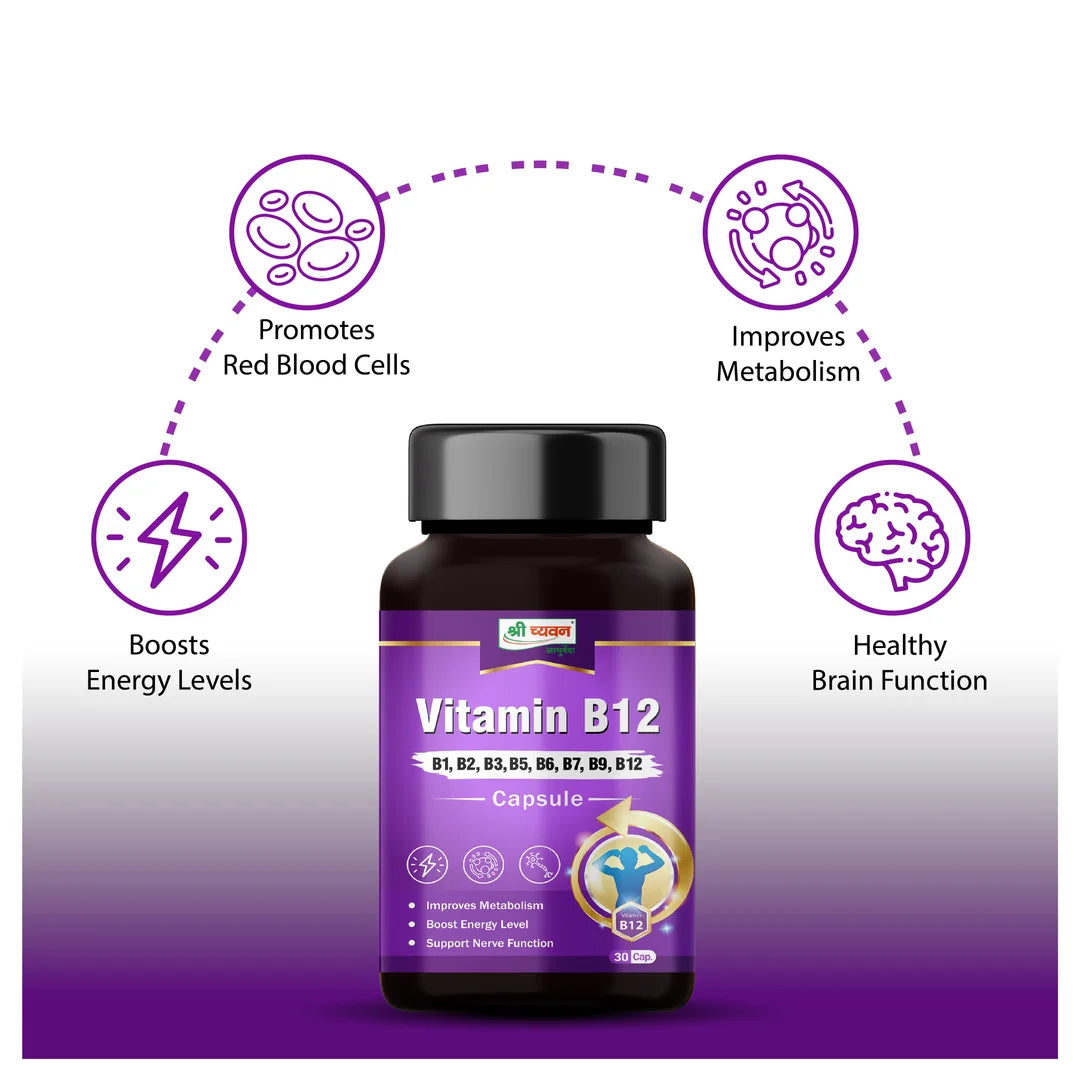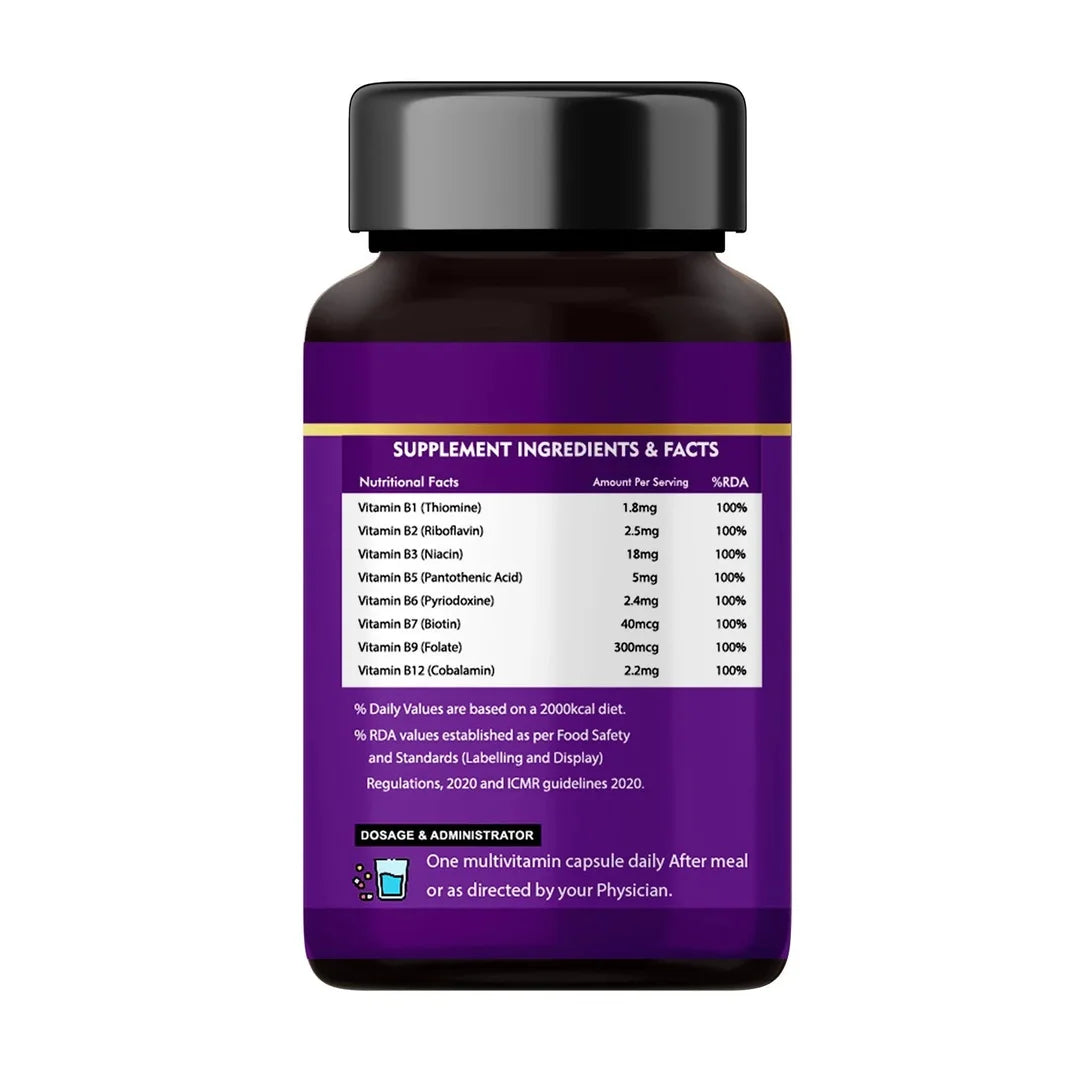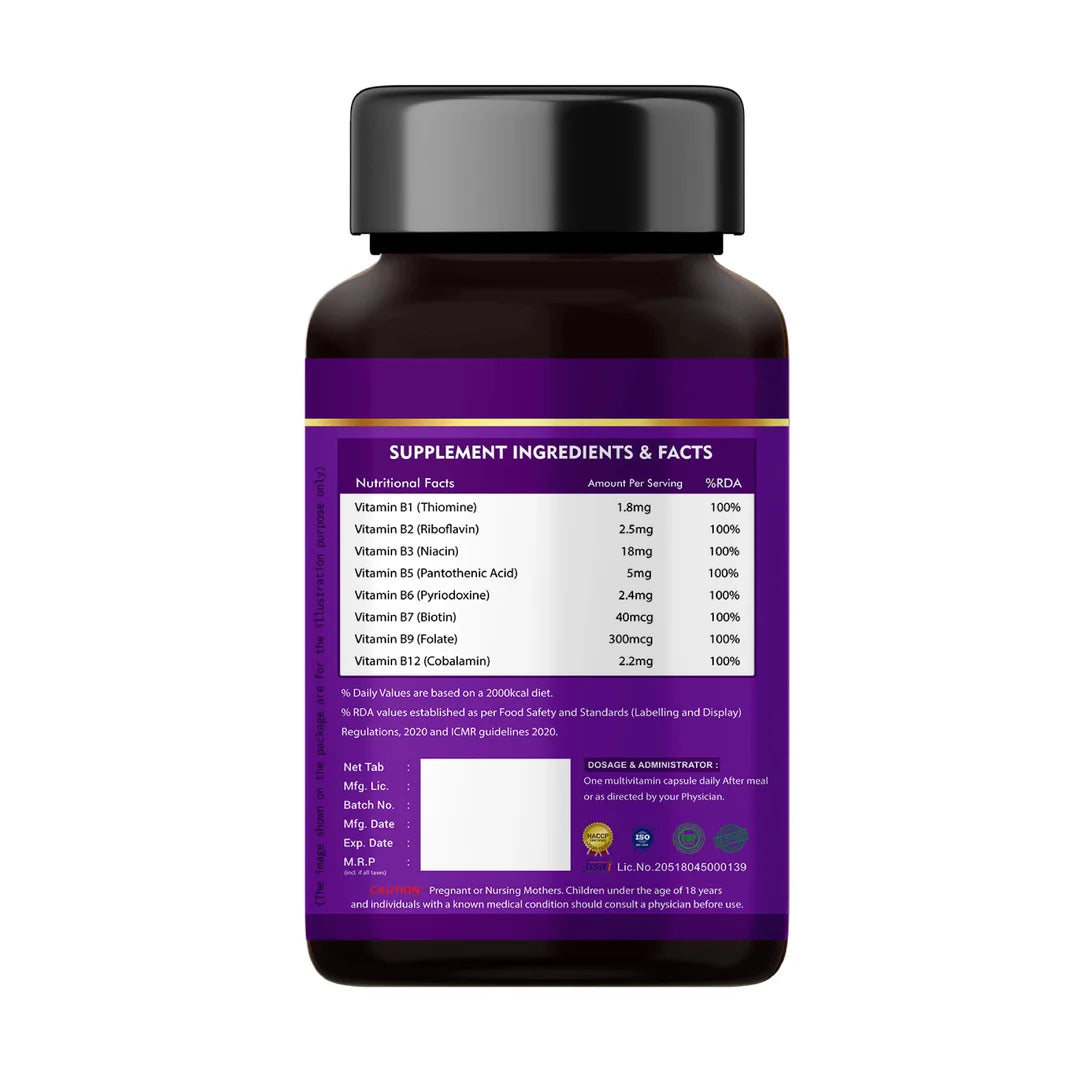Vitamins are essential nutrients that play crucial roles in various bodily functions, ranging from metabolism to energy production and nerve function. Among these vital vitamins, the B-complex vitamins-comprising Vitamin B1 (thiamine), Vitamin B2 (riboflavin), Vitamin B3 (niacin), Vitamin B5 (pantothenic acid), Vitamin B6 (pyridoxine), Vitamin B7 (biotin), Vitamin B9 (folate), and Vitamin B12 (cobalamin)-stand out for their multifaceted contributions to overall health and well-being.
In this comprehensive guide, we'll delve into the importance of each B vitamin, focusing on the range of benefits they offer and their dietary sources.
Vitamin B1 (Thiamine)
Description: Vitamin B1, also known as thiamine, is crucial for converting carbohydrates into energy. It also plays a key role in nerve function and maintaining a healthy cardiovascular system.
Benefits:
- Supports energy metabolism
- Promotes proper nerve function
- Aids in the synthesis of neurotransmitters
- Essential for maintaining a healthy heart and cardiovascular system
- Food Sources: Thiamine-rich foods include whole grains, legumes, nuts, seeds, pork, and fortified cereals.
Vitamin B2 (Riboflavin)
Description: Vitamin B2, or riboflavin, is essential for energy production, cellular growth, and maintaining healthy skin, eyes, and nervous system.
Benefits:
- Supports energy metabolism
- Promotes healthy skin and vision
- Plays a role in antioxidant activity
- Supports red blood cell production
- Food Sources: Riboflavin can be found in dairy products, lean meats, green leafy vegetables, and fortified cereals.
Vitamin B3 (Niacin)
Description: Vitamin B3, also known as niacin, is essential for energy production, DNA repair, and maintaining healthy skin, nerves, and digestive system.
Benefits:
- Supports energy metabolism
- Promotes healthy skin and nervous system
- Helps lower LDL cholesterol and triglycerides
- Supports digestive health
- Food Sources: Niacin-rich foods include poultry, fish, peanuts, whole grains, and fortified cereals.
Vitamin B5 (Pantothenic Acid)
Description: Vitamin B5, or pantothenic acid, is vital for energy production, hormone synthesis, and the metabolism of fats, proteins, and carbohydrates.
Benefits:
- Supports energy metabolism
- Plays a role in hormone production
- Helps maintain healthy skin and hair
- Supports wound healing
- Food Sources: Pantothenic acid can be found in avocados, eggs, meats, whole grains, and legumes.
Vitamin B6 (Pyridoxine)
Description: Vitamin B6, or pyridoxine, is involved in over 100 enzyme reactions in the body, including amino acid metabolism, neurotransmitter synthesis, and immune function.
Benefits:
- Supports amino acid metabolism
- Promotes neurotransmitter synthesis
- Supports immune function
- Helps regulate mood and sleep patterns
- Food Sources: Pyridoxine-rich foods include poultry, fish, bananas, potatoes, nuts, and seeds.
Vitamin B7 (Biotin)
Description: Vitamin B7, also known as biotin, is essential for energy metabolism, fatty acid synthesis, and maintaining healthy hair, skin, and nails.
Benefits:
- Supports energy metabolism
- Promotes healthy hair, skin, and nails
- Aids in fatty acid synthesis
- Helps regulate blood sugar levels
- Food Sources: Biotin can be found in egg yolks, nuts, seeds, salmon, avocados, and sweet potatoes.
Vitamin B9 (Folate)
Description: Vitamin B9, or folate, is essential for DNA synthesis, cell division, and red blood cell formation. It is particularly important during pregnancy for fetal development.
Benefits:
- Supports DNA synthesis and cell division
- Essential for red blood cell formation
- Important for fetal development during pregnancy
- Helps prevent neural tube defects
- Food Sources: Folate-rich foods include leafy green vegetables, legumes, citrus fruits, fortified grains, and liver.
Vitamin B12 (Cobalamin)
Description: Vitamin B12, or cobalamin, is crucial for nerve function, DNA synthesis, red blood cell formation, and energy metabolism.
Benefits:
- Supports nerve function and brain health
- Essential for DNA synthesis and red blood cell formation
- Aids in energy metabolism
- Helps prevent megaloblastic anemia
- Food Sources: Vitamin B12 is primarily found in animal products such as meat, fish, poultry, eggs, and dairy. Plant-based sources include fortified cereals, nutritional yeast, and certain types of algae.
How to Use:
One multivitamin capsule daily with a main meal or as directed by your Physician.
The B-complex vitamins, from Vitamin B1 to B12, are integral for maintaining overall health and vitality. Incorporating a variety of foods rich in B vitamins into your diet can help ensure you meet your daily requirements and support optimal health. If you have specific health concerns or dietary restrictions, consult with a healthcare professional or registered dietitian for personalized guidance on meeting your nutritional needs. Embrace the power of B vitamins and unlock the potential for vibrant health and well-being!
FAQ's
1. Why are B-complex vitamins important for overall health?
Answer: B-complex vitamins play crucial roles in various bodily functions, including energy metabolism, nerve function, DNA synthesis, and red blood cell formation. They are essential for maintaining overall health and vitality.
2. What are the main sources of B-complex vitamins in the diet?
Answer: B-complex vitamins can be found in a variety of foods, including whole grains, lean meats, poultry, fish, eggs, dairy products, legumes, nuts, seeds, fruits, and vegetables. Fortified foods such as cereals and nutritional yeast are also good sources of B vitamins.
3. What are the symptoms of B vitamin deficiency?
Answer: Symptoms of B vitamin deficiency can vary depending on the specific vitamin that is deficient. Common symptoms may include fatigue, weakness, poor concentration, nerve damage, skin disorders, digestive issues, and anemia. Severe deficiencies can lead to more serious health problems.
4. Can B-complex vitamins help with energy levels and fatigue?
Answer: Yes, B-complex vitamins play a key role in energy metabolism and can help support energy levels. They are involved in converting carbohydrates, fats, and proteins into energy, and deficiencies in B vitamins can lead to fatigue and weakness.
5. Are B-complex vitamins safe to take as supplements?
Answer: In general, B-complex vitamins are safe to take as supplements when taken within recommended doses. However, it's important to consult with a healthcare professional before starting any new supplement regimen, especially if you have underlying health conditions or are taking medications.
6. Can B vitamins be harmful if taken in excess?
Answer: While B vitamins are water-soluble and generally considered safe, taking excessive amounts of certain B vitamins, particularly B6 and B12, can cause adverse effects. It's important to follow recommended dosage guidelines and avoid mega-dosing without medical supervision.
7. Are there any interactions between B-complex vitamins and medications?
Answer: Certain medications may interact with B-complex vitamins, either by reducing their absorption or affecting their metabolism. If you are taking any medications, including prescription drugs, over-the-counter medications, or supplements, it's advisable to consult with a healthcare professional before taking B-complex vitamins.
8. Can B-complex vitamins be beneficial for specific health conditions?
Answer: Yes, B-complex vitamins may be beneficial for specific health conditions, such as nerve disorders, cardiovascular health, prenatal health, and mental health issues like depression and anxiety. However, individual responses may vary, and it's important to seek professional advice for personalized recommendations.
9. Are there any dietary restrictions or lifestyle factors that can affect B vitamin absorption?
Answer: Certain dietary restrictions, such as vegetarian or vegan diets, may increase the risk of B vitamin deficiencies, particularly Vitamin B12. Additionally, lifestyle factors such as alcohol consumption, smoking, and stress can affect B vitamin absorption and metabolism.
10. What are some tips for incorporating more B-complex vitamins into the diet?
Answer: To increase your intake of B-complex vitamins, focus on consuming a balanced diet that includes a variety of whole foods rich in B vitamins. Incorporate foods such as whole grains, lean proteins, fruits, vegetables, nuts, and seeds into your meals and snacks to ensure you're getting a sufficient intake of these essential nutrients. Additionally, consider taking a B-complex supplement if needed, but always consult with a healthcare professional before doing so.








